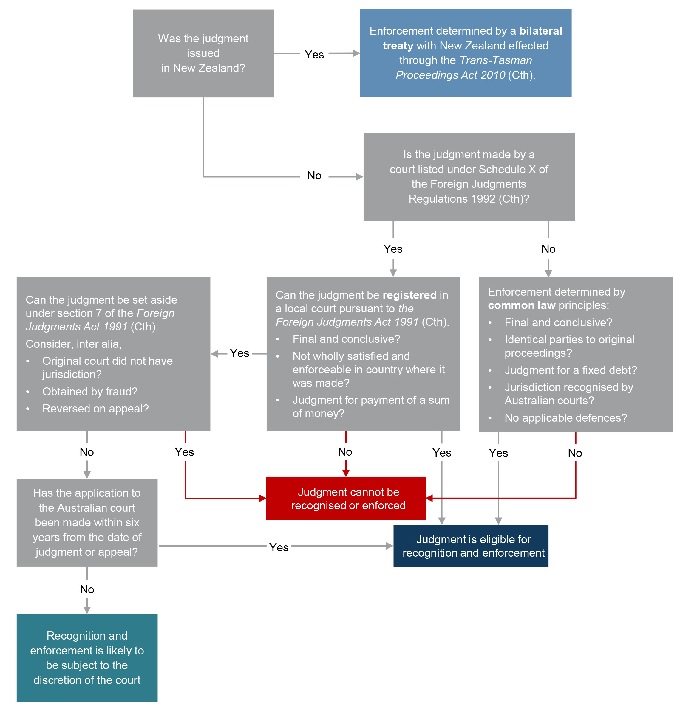- within International Law, Media, Telecoms, IT, Entertainment and Energy and Natural Resources topic(s)
- with Finance and Tax Executives and Inhouse Counsel
- with readers working within the Environment & Waste Management and Law Firm industries
On 29 August 2022, the European Union (EU) and Ukraine deposited their instruments of accession and ratification, respectively, to the Convention of 2 July 2019 on the Recognition and Enforcement of Foreign Judgments in Civil or Commercial Matters (Judgments Convention or Convention).
As a result, in less than a year's time, on 1 September 2023, the Judgments Convention will enter into force - just four years after the adoption of the Convention on 2 July 2019.
This Insight provides a brief overview of the history and principal features of the Convention. It then considers the prospects and implications of Australia ratifying the Convention.
Overview of the Judgments Convention
Origins of the Judgments Project
The Judgments Convention is a long-awaited convention with its origins dating back to the early 1990s. In 1992, the Hague Conference on Private International Law (HCCH) commenced work on an instrument to harmonise rules on the jurisdiction of courts and the recognition and enforcement of judgments in cross-border civil and commercial matters.
One of the first outcomes of the project was the Hague Convention of 30 June 2005 on Choice of Court Agreements (the Choice of Court Convention), which aims to ensure the effectiveness of choice of court agreements in civil and commercial matters. The Choice of Court Convention entered into force in 2015 and is currently in force as between the EU (including Denmark), Mexico, Montenegro, Singapore and the United Kingdom. Up-to-date information on the signatories to the Convention can be found in the HCCH's Status Table.
Following the successful conclusion of the Choice of Court Convention, the HCCH established in 2012 a working group to prepare a draft text aimed at facilitating the global circulation of judgments. The first draft of the text was completed in October 2015. Following that, the draft underwent a series of discussions and revisions – leading to the conclusion of the final text on 2 July 2019, at the 22nd Diplomatic Session of the HCCH.
Currently, in addition to the EU and Ukraine, five other states have signed the Convention. They are the United States of America, the Russian Federation, Costa Rica, Israel and Uruguay. Up-to-date information on the signatories to the Convention can be found in the HCCH's Status Table.
Principal features of the Judgments Convention
The Judgments Convention provides for the recognition and enforcement of judgments in civil or commercial matters (article 1). The Convention has broad scope of application, but excludes certain matters such as the status and legal capacity of persons, family law matters, insolvency matters, privacy matters, intellectual property and certain anti-trust matters (article 2(1)).
Further, it does not apply to arbitration and related proceedings (article 2(3))1 or to interim measures of protection (article 3(1)(b)). Contracting Parties to the Convention may also declare that the Convention does not apply to certain other specific matters (article 18(1)).
In determining whether a foreign judgment of a Contracting Party is to be recognised and enforced under the Convention, a court will consider two factors:
- The first is whether a judgment is eligible for circulation
under the Convention. To determine this, a court will
consider the indirect grounds of jurisdiction listed under article
5(1). These grounds fall into three broad categories based on:
the connection between the state of origin and the defendant
(e.g. habitual residence in the state of origin):
jurisdiction based on consent (e.g. express consent to the
court of origin in the course of proceedings); or a connection
between the claim and the state of origin (e.g. place of
performance of the contract). Additionally, article 6 provides for
the circulation of judgments ruling on rights in rem in
immovable property – but if, and only if, the immovable
property is located in the State which rendered the judgment sought
to be enforced.
- Second, a court may consider whether the grounds for refusal under article 7, are applicable. There are two categories of grounds based on the way the proceedings took place in the state of origin (e.g. improper notice); or based on the nature and content of the judgment (e.g. where the judgment is inconsistent with a judgment given by a court of the state in which enforcement is sought). Recognition and enforcement can only be refused based on one of the grounds listed in the Convention.
It is important to note that, with the one exception identified above in relation to judgments ruling on rights in rem in immovable property, the Convention does not prevent or limit the recognition and enforcement of judgments under national law, bilateral, regional or other international instruments (articles 15 and 23).
For a detailed overview and explanation of the provisions of the Convention, see the Explanatory Report available on the HCCH website.
Would Australia benefit from joining the Convention?
Current framework for enforcing a foreign judgment in Australia
The current framework for enforcing a foreign judgment in Australia involves an overlay of treaties, a statutory regime and common law principles and is, according to the Attorney-General's Department, a "complex process".
Whether a foreign judgment can be enforced in Australia depends on where the judgment was issued and what type of judgment it is. The current regime in Australia is illustrated by the following diagram:

For a step-by-step procedure of determining enforcement of foreign judgments in Victoria, refer to the Victorian Supreme Court Practice Note.
What will it mean for Australia to join the Judgments Convention?
The Judgments Convention aims to establish uniform rules on recognition and enforcement of judgments among Contracting Parties.
For Australia, the benefits of ratifying the Judgments Convention include:
- The Convention expands the grounds for recognising and
enforcing foreign judgments in Australia. Most significantly, the
Convention provides for the enforcement of non-money judgments and
a much broader list of grounds on which recognition and enforcement
may be based.
- Assuming widespread ratification of the Convention, Australian
judgments will have significantly increased prospects of being
recognised and enforced overseas. This means that parties involved
in cross-border litigation who obtain an Australian judgment will
be able to access meaningful relief in foreign jurisdictions
without the need to re-litigate their dispute.
- The Convention will align Australia's private international law with that of other Contracting Parties, leading to greater certainty and predictability for Australian enterprises engaging in cross-border transactions with entities from other contracting states and vice-versa.
Is it likely that Australia will become a party to the Hague Judgments Convention?
Australia has a long history of engaging with the work of the HCCH since it joined the HCCH in 1973. Currently, it has joined 11 HCCH instruments and has implemented these instruments to varying degrees.
Australia actively participated in the negotiations for the Judgments Convention, including at the Diplomatic Session at which the Convention was finalised. In 2018, the Attorney-General's Department conducted a public consultation on the draft text of the Convention.2 In addition, the Australian Government provided financial support to the continuation of the Judgments Project for a number of years.
While, as at the date of writing, there is no public indication that Australia will join the Convention, against the backdrop of the Australian Government's support for and participation in the negotiation of the Convention, and with no perceived disadvantages to Australia joining the Judgments Convention, it seems likely that Australia will follow in the footsteps of the EU and Ukraine.
Footnotes
1 Attorney-General's Department, 'Hague Conference Judgments Project: Recognition and Enforcement of Foreign Judgments' ( Public Consultation Paper, March 2018). See submissions here.
2 Recognition and enforcement of arbitral awards is covered by the New York Convention on the Recognition and Enforcement of Foreign Arbitral Awards, more commonly known as the New York Convention.
The content of this article is intended to provide a general guide to the subject matter. Specialist advice should be sought about your specific circumstances.
 |
 |
| Lawyers Weekly
Law firm of the year
2021 |
Employer of Choice for Gender Equality
(WGEA) |




